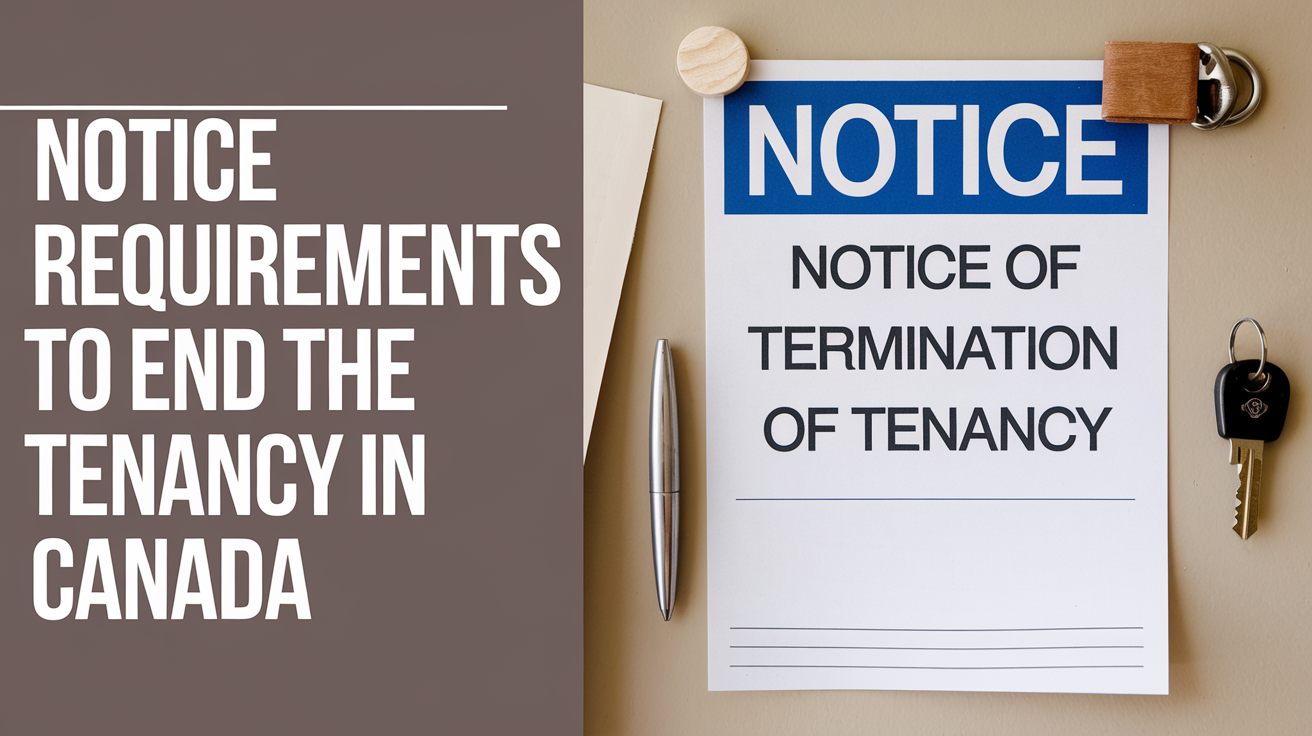
- Tajinder Kaur Sivia
- 05-Sep-2024
The complex process of ending a tenancy can be challenging for both landlords and tenants. The notice periods required to terminate a tenancy in Canada can be different for different provinces and territories, governed by their respective Residential Tenancy Acts. In this article, we will provide a panoramic overview of the general notice requirements across Canada.
A thorough understanding of these regulations is important for a tenant planning to move out or a landlord preparing to end a tenancy, to ensure a smooth and legally compliant transition. General Notice Period Requirements Across Canada
The notice period to end a tenancy in Canada depends on the type of rental agreement and the jurisdiction. The common notice requirements applicable in most provinces are as follows:
Fixed-Term Tenancies: A fixed-term tenancy is one with a fixed end date, like a one-year lease. This tenancy automatically ends on this date unless a renewal or extension is agreed by both parties.
Notice Requirement: Usually, no notice is required to end the fixed-term tenancy. However, for the tenant wishing to end the tenancy before the fixed term expires, the landlord’s agreement is mandatory to avoid facing potential penalties.
Similarly, a landlord wishing to end the tenancy earlier than the stipulated date must have a valid reason or may also face penalties.
Month-to-Month or Periodic Tenancies:
A month-to-month tenancy constitutes an agreement that continues until either the tenant or landlord provides notice to end it. The usual notice period across most provinces is one full rental period ( mostly 30 days) from the end of the current month. The tenant must provide a written notice at least one month before the date of vacating.
Landlord-Specific Notice:
In many provinces, a landlord wishing to end a tenancy, especially for reasons such as renovations, sale of the property, or personal use, the notice period may be longer, ranging from 60 days to several months, depending on the particular circumstances and provincial regulations. Notice Period Requirements in British Columbia (BC)
Significant changes to tenancy laws have been recently introduced by British Columbia, impacting both the notice period and the procedures for ending a tenancy.
These updates are a part of the province's efforts to protect tenant rights while balancing the needs of landlords. Recent legislative changes, effective July 18, 2024, have further refined these conditions to enhance the protection of the tenants, ensuring fair treatment for all parties.
Key Updates Effective July 18, 2024
- Extended Notice Period for Landlords
- A four-month notice must now be provided by the landlords to terminate a tenancy. This is up from the previous two-month requirement.
This extension is aimed at offering tenants more time to secure alternative housing and addresses the pressures faced by the housing sector.
Shortened Notice Period for Property Sales
The notice period for evictions related to property sales has been now reduced from four months to three months to balance the need for flexibility in property transactions while protecting the interest of the tenants.
Mandatory Online Use of the Residential Tenancy Branch (RTB)
Portal: All eviction notices must now be issued through the new online portal of RTB to ensure transparency & compliance with updated regulations.
Tenant Rights: Tenants have 30 days to dispute a notice via the RTB portal emphasising the relevance of accurate & clear communication.
Good Faith Requirement:
Under Sections 49 and 49.1 of the RTA, landlords must have an intention to reside in the property for at least 12 months after it is vacated by the tenant.
Any error to act in good faith can result in penalties as it can be deemed as a bad faith eviction.
Tenant Responsibilities in British Columbia
Requirements by the Tenants
Tenants in BC also have particular responsibilities when ending their tenancy, especially regarding the notice periods and compliance with the Residential Tenancy Act (RTA). Notice Requirements for Tenants in British Columbia
Month-to-Month Tenancies: At least one month’s written notice, including the tenant’s name, the date of the notice, the rental unit’s address, the planned move-out date, and the tenant’s signature, must be provided by the Tenants, at the same time making sure that the same is received before the rent is due.
- Fixed-Term Tenancies: A tenant wishing to end a fixed-term tenancy at the end of the lease, must also provide at least one month’s notice before the lease expires. A fixed-term tenancy that is ended before the actual ending of the lease requires a mutual agreement between the tenant and landlord. Special circumstances, such as fleeing from violence or having been assessed for long-term care, can also be considered.
Ending a Tenancy in Strata Properties
There is a specific set of rules that apply to Strata housing that differ from typical rental agreements and must be adhered to, by the tenants in Strata housing. A tenant in a strata property can end their tenancy without penalty. However, the strata corporation holds the authority to terminate the tenancy if
- the bylaws are repeatedly violated by the tenant or if the tenant significantly interferes with others' use or enjoyment of the property.
- landlord is not able to/ not willing to address the problem.
It is very important to understand & comply with strata bylaws to avoid issues that could lead to tenancy termination.
Ending a Tenancy: Tenant’s Perspective
There are some particular steps needed to be followed by a tenant ending a tenancy to ensure compliance with the RTA.
These are as follows:
Notice Requirements for Tenants
Section 45 of the Residential Tenancy Act directs the tenants to provide written notice to their landlord while ending a tenancy.
The notice should include:
- Tenant’s name
- Date of the notice
- Address of the rental unit
- The date the tenant plans to vacate
- Tenant’s signature
A copy of the notice should be retained by both parties for their records. Any failure to serve proper notice or leaving a tenancy early without an agreement from the landlord can lead to the tenant paying compensation.
After The Tenancy Ends
Both landlords and tenants have specific responsibilities after the tenancy ends, to ensure a smooth transition:
For Tenants
- Information of the New Mailing Address: Tenants should provide the landlord with their new mailing address in writing so that the return of the damage deposit after the move-out condition inspection can be facilitated.
- Return Deposits and Handle Cheques: A tenant must make sure that all deposits and post-dated cheques are returned or managed according to RTA guidelines.
For Landlords
- Move-Out Inspections: The landlord must inspect the condition of the rental unit and decide if any deductions from the damage deposit are necessary.
- Return Deposits Promptly: The landlord must follow the RTA regulations for returning deposits to avoid disputes.
It is important to mention here that under the new legislation, tenants may request an extension to the 30-day dispute period by submitting a request through the RTB portal with a valid reason. While this does not guarantee an extension, it provides the tenant with additional flexibility in certain situations.
Conclusion
It is extremely important to understand the notice period required to end a tenancy for both tenants and landlords in Canada, particularly in British Columbia, where recent legislative changes have introduced new requirements. The extended notice period and the mandatory use of the RTB online portal emphasise the importance of compliance and transparency in the tenancy process. Staying informed and adhering to these updated regulations can facilitate a smooth and fair transition by both parties while ending a tenancy.


